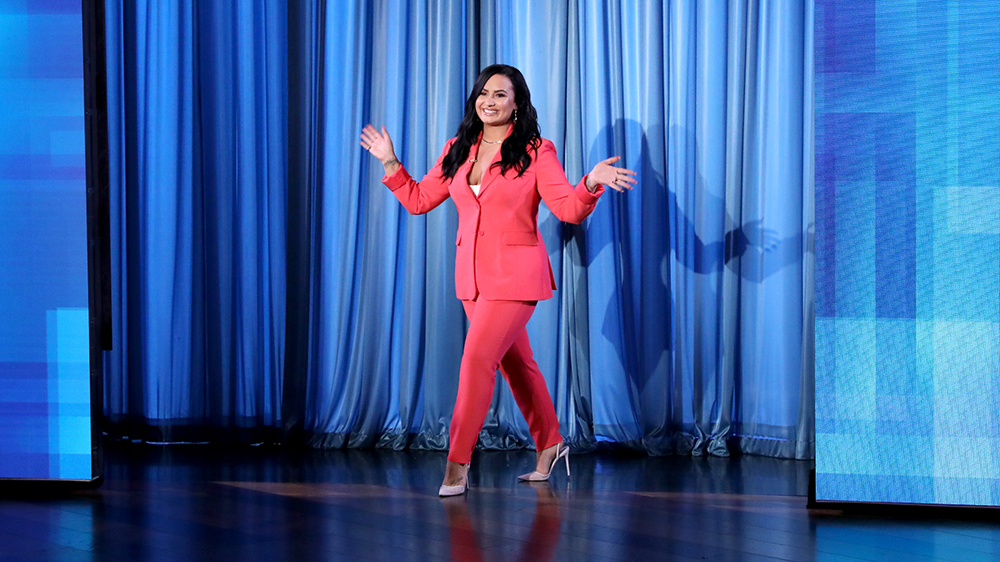All You Need Is Self-Love: The Wave of Wellness Songs Explained
By James Patrick Herman
LOS ANGELES (Variety.com) – Demi Lovato premiered a new single today. Titled “I Love Me,” the song is a reckoning of sorts: a coming-to-terms acceptance of herself, warts and all. It features the chorus: “I wonder when I love me is enough? / Why am I always looking for a ride or die? / ‘Cause mine’s the only heart I’m gonna have for life.” The bridge concludes: “I’m a ten out of ten, don’t you ever forget it.” The video for “I Love Me” has racked up some 5.5 million views on YouTube in its first 24 hours.
It’s not a new concept — as Whitney Houston sang back in 1985 (and currently as a hologram touring Europe), “Learning to love yourself / It is the greatest gift of all.” However, the late superstar’s death by accidental drowning — following decades of substance abuse struggles and, according to her ex-lover Robyn Crawford, internalized homophobia — suggests that she was never able to fully embrace that mantra.
But recent years have seen a steady stream of popular songs about self-acceptance, among them: Selena Gomez’s “Lose You to Love Me,” Taylor Swift’s “ME!,” Meghan Trainor’s “I Love Me,” Hailee Steinfeld’s “Love Myself” and Elton John’s Oscar-winning “(I’m Gonna) Love Me Again.” One would reason that today’s focus on mental health is driving much of this artistic self-reflection, and that’s certainly true to a large extent. Another sociological factor may be the oversharing nature of our social media-obsessed lives, where both lows and highs are analyzed in real time — and also open the door to criticism spurring another look inward.
Grammy-winner Lizzo has emerged as the poster girl for the self-love musical movement, and rightly so. “Journey is really a poignant word for what she has gone through as far as working in the self-love space,” her producer, Ricky Reed, told Variety last year. “Because as she’ll say, she has been talking about loving yourself for a long time — well before ‘wellness’ was a buzzword. Go back and listen to her song, ‘My Skin.’ That was the one that put her on the map. … Like everybody else, has had ups and downs and gone through struggles — it definitely has not been a straight and narrow path. But I think that her mantra of self-love has helped her get to where she is now.”
“It’s my favorite thing to write about,” Grammy- and Golden Globe-nominated songwriter Justin Tranter said on the subject of self-love. “I am basically married to myself — I put a big fat ring on my finger — so anytime I get a chance to work on a project that puts the focus on loving yourself, it’s very inspiring to me.”
Tranter has found multiple opportunities in recent years to shine a light on self-love. As he told Variety: “Whether it was ‘Love Myself’ [in 2015] for Hailee Steinfeld or ‘Believer’ [2017] with Imagine Dragons, about Dan [Reynolds] going through a journey of self-love or Selena [Gomez], my job is to elevate what the artist is thinking. And if there are moments where we can focus on self-love and growth, then I lunge full force at those ideas.”
“Lose You to Love Me” — Tranter’s most recent songwriting collaboration with Gomez, which may or may not be in reference to her ex Justin Bieber — resulted in a No. 1 hit for the singer. “Everyone wants to hear artists be honest and authentic, and she honestly and authentically sings: ‘To love me, to love me, to love me,’ ” said Tranter. “In these very divisive, f–ked up times, that’s a message everybody wants to hear.”
Curiously, songs about falling in love or feeling affection for another person are virtually nonexistent on the charts these days. For instance, Rolling Stone’s latest top 50 ranking features only two songs with “love” in the title: Lewis Capaldi’s “Someone You Loved” and Lady Gaga’s “Stupid Love.” The former tellingly uses the past tense and evokes a feeling of hopelessness (as opposed to the feelings of a hopeless romantic) — “I’m going under, and this time, I fear there’s no one to save me,” Capaldi laments.
Gaga, meanwhile, focuses on a more universal concern. “The message behind ‘Stupid Love’ is important and timely because there’s nothing more powerful than love to heal the world,” Gaga has said. Never one to ignore the Zeitgeist, however, Gaga also alluded to the importance of empowering oneself with lyrics like “Nobody’s gonna heal me” and “Gotta have faith in me.” She was more explicit in the messaging that accompanied last year’s debut of her beauty brand, Haus Labs: “We want you to love yourself.”
Jason King, a New York University professor who teaches the history of pop music, was quoted in The Undefeated as saying: “In the last 10 to 15 years, you’ve seen black musicians in R&B and hip-hop still exploring issues of intimacy, but doing it through the lens of damage.” Today, he added, “you have Drake with ‘Fake Love’ or ‘Passionfruit,’ where it’s like, how do I have trust in a relationship? Or Cardi B, who does rap a lot about relationships, but there’s a lot of cynicism there.”
King cited Aretha Franklin as the classic example of an artist who “knew how to exalt a kind of all-encompassing love with a capital L. I think younger artists are not that interested in that notion,” he said.
An essay titled “What Our Current Music Choices Say About Modern Love” in the online magazine Galore further commented on the trend: “You’ll recognize two distinct themes — breakups and sex. But what happened to the love song?”
Back in 1976, Paul McCartney sang: “You’d think that people would have had enough of silly love songs.” Evidently, in 2020, we finally have.

